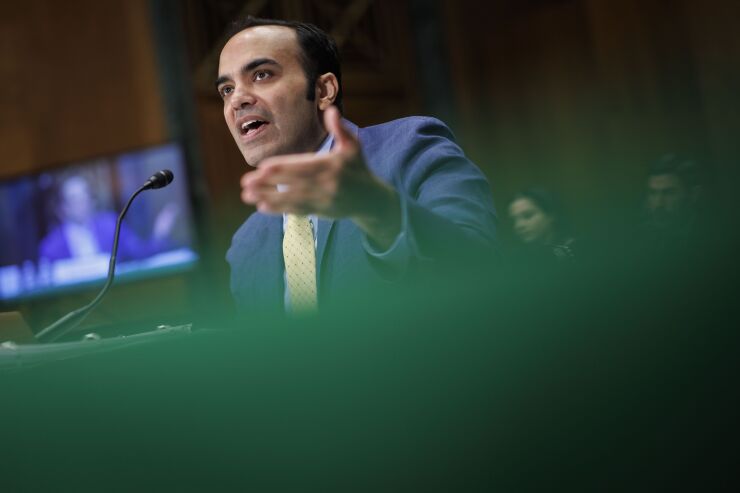
WASHINGTON — Consumer Financial Protection Bureau Director Rohit Chopra is asking Congress to reconsider deposit insurance limits after the
The tiny First National Bank of Lindsay in Oklahoma was shuttered in October after the Office of the Comptroller of the Currency found "false and deceptive bank records and other information suggesting fraud." At the time, the Federal Deposit Insurance Corp. said that it would make 50% of uninsured funds available to depositors.
This puts the failure of this small bank in sharp contrast with the much larger Silicon Valley Bank and Signature Bank, which failed last year. Regulators at that point announced a systemic risk exception, which means that many of the large companies with uninsured deposits at those institutions were able to access their money in full.
"In other words, big businesses putting their money in big banks enjoy free deposit insurance, and small businesses putting their money in small banks don't," said Chopra in a statement for the record in connection with a closed FDIC board meeting last week. "This is fundamentally unfair."
Chopra called on Congress to remedy the situation.
"It is time for Congress to remove — or at least dramatically increase — limits on federal deposit insurance for payroll and other noninterest bearing operating accounts," he said.
After the failure of Silicon Valley Bank and Signature, some lawmakers showed willingness to reconsider the structure of deposit insurance, although those efforts faded quickly as turmoil in the large regional bank sector seemed to normalize.
Rep. French Hill, R-Ark., who is in the running to lead the House Financial Services Committee in the new Congress,
"I think the events surrounding Signature and Silicon Valley will prompt a post-Congressional and financial federal regulatory review of the deposit insurance system," he said. "I recall very well that from 2009 to 2010 when the federal government guaranteed all deposits in that period of time, many people suggested that all deposits would go to the large GSIB type banks."
And while Hill's
Vice President elect Sen. JD Vance, R-Ohio,
"The idea is that if you have a few million dollars that comes in at the end of the day and accounts receivable in your bank collapses, you're not penalized for this," Vance said at a July 2023 hearing. "You're not, you know, in other words, we're not penalizing businesses for using a bank as a bank."
Sen. Tim Scott, R-S.C., who is set to become the Senate Banking Committee chairman, signaled openness to the idea.
"The bank run that was created in part by social media is something obviously we've never seen before," Scott said at the time. "I'd love for us to contemplate what types of changes are necessary because of the technological evolution that we're seeing in the space, and how we're trying to insulate our financial system going forward."






